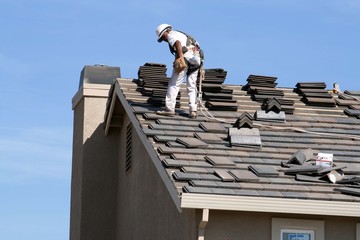If you have just finished college and are ready to go out on your own, you may be wondering what type of training you need to get started in a career as a roofing contractor. There are a number of things you can do to prepare yourself. Some of the things you need to consider include: licensing, insurance, experience, and timeframe. 
Roofing Contractors perform different jobs, from installing shingles to repairing other roof-related work. They also install insulation, vapor barriers, and other materials. In addition, they may charge a premium for specialty or sloped roofs. A roofing contractor must be reliable, have the stamina to lift heavy loads, and have the ability to work in all types of weather.
In some states, roofing contractors are required to obtain a license. Check with your local building department to find out if you need a license. This helps you make sure you are doing the right thing when you’re doing your job.
There are also special licensing requirements in some areas. For example, in Hawaii, a roofer needs a roofing contractor license. Similarly, in Alaska, a contractor needs a roofing license. These can be obtained through the state Department of Commerce.
Depending on your state, you may be required to obtain a certain number of continuing education hours each year. Some states require only 14 hours of continuing education every year, while other states require more. You can get more information about the continuing education requirements of your state on the Contractor’s License reference site.
In some areas, a roofing contractor is also required to pass a trade exam. For example, in Hawaii, a licensed roofer must pass a law and business examination.
Roofing contractors may be required to obtain insurance in order to operate. There are several different types of insurance available, and they vary by jurisdiction, state, and type of business.
One of the most important insurance requirements for roofing contractors is a surety bond. This allows you to get insured in case you are sued or lose a lawsuit. You can find out what’s required for your specific municipality by calling local licensing offices.
Another important insurance requirement is a general liability policy. You can protect your investment and customers by having the proper coverage. In addition to protecting your investment, a general liability policy will also cover damages to your customers’ property and third party claims.
For most roofing companies, a commercial general liability policy can range from $2 million to $5 million. However, you can opt for a higher level of coverage by purchasing an umbrella insurance plan.
The roofing industry is a regulated one, which means you should do all you can to protect yourself and your customers. Insurance is a wise investment. It will ensure that you are compensated for any accidents or injuries your employees and subcontractors cause.
The timeframe for hiring a roofing contractor can vary depending on a number of factors. It all depends on the size of your home and the type of roof you need. Getting an estimate from multiple contractors will give you a good idea of how long it will take.
Some roofing contractors will even offer clean-up services. This can be a major convenience for homeowners, especially if you have pets or kids that will be left home during the project.
In terms of the timeframe for hiring a roofing contractor, the best time to begin is when the weather is cooperative. Roofing work can be interrupted by inclement weather, so it’s important to have a roofer that’s willing to go the extra mile.
Depending on the size of your home, the timeframe for hiring a roofing contractor can be as short as two days, or as long as several weeks. Regardless of the length, you should have a clear understanding of the project’s timeline before you commit to a contract.
If you are planning to become a roofing contractor, you need to be sure that you have the right training and experience. This is because there are different rules and regulations that govern the roofing industry. You should be aware of these before you apply for a roofing contractor license.
There are also a number of apprenticeship programs available for prospective roofers. These are good ways to gain practical skills, and they do not require permits or insurance. However, they can take a while to complete. Some states require a specific number of years of work experience before you can apply for a roofing contractor license. For instance, Hawaii requires four years of experience.



